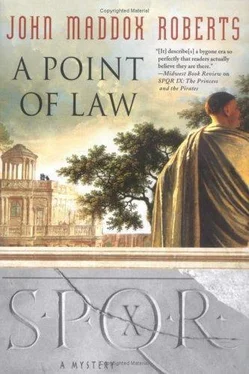John Roberts - A Point of Law
Здесь есть возможность читать онлайн «John Roberts - A Point of Law» весь текст электронной книги совершенно бесплатно (целиком полную версию без сокращений). В некоторых случаях можно слушать аудио, скачать через торрент в формате fb2 и присутствует краткое содержание. Год выпуска: 0101, ISBN: 0101, Издательство: St. Martin, Жанр: Исторический детектив, на английском языке. Описание произведения, (предисловие) а так же отзывы посетителей доступны на портале библиотеки ЛибКат.
- Название:A Point of Law
- Автор:
- Издательство:St. Martin
- Жанр:
- Год:0101
- ISBN:9780312337254
- Рейтинг книги:5 / 5. Голосов: 1
-
Избранное:Добавить в избранное
- Отзывы:
-
Ваша оценка:
- 100
- 1
- 2
- 3
- 4
- 5
A Point of Law: краткое содержание, описание и аннотация
Предлагаем к чтению аннотацию, описание, краткое содержание или предисловие (зависит от того, что написал сам автор книги «A Point of Law»). Если вы не нашли необходимую информацию о книге — напишите в комментариях, мы постараемся отыскать её.
A Point of Law — читать онлайн бесплатно полную книгу (весь текст) целиком
Ниже представлен текст книги, разбитый по страницам. Система сохранения места последней прочитанной страницы, позволяет с удобством читать онлайн бесплатно книгу «A Point of Law», без необходимости каждый раз заново искать на чём Вы остановились. Поставьте закладку, и сможете в любой момент перейти на страницу, на которой закончили чтение.
Интервал:
Закладка:
The upshot of it all was that, once again, Italy was being inundated by a flood of cheap slaves, with consequent effects on the economy and on society in general, making it harder for freeborn Italians to make a living, throwing yet more peasants out of work. It always happened after a big war. You would think we’d learn better, but we never have.
Cato showed up, plodding around barefooted, walking up and down the rows of tents like a new commander on his first inspection. He came to join us where we watched the market taking shape in front of Pompey’s Portico, just north of his theater. For once, Cato’s ugly face wasn’t scowling.
“These are real Roman soldiers,” he said approvingly. “These men could have gone toe-to-toe with Hannibal’s.”
“Hurts to say it, eh, Cato?” said Scribonius Libo.
“The times are decadent,” Cato answered, “but there is nothing wrong with Italian manhood. I disapprove of Caesar, and I’ve never made a secret of it. He is a man with too much ambition and too little respect for the Senate. But he knows how to use an army. He knows how to train and discipline soldiers, too. He doesn’t spoil and flatter and bribe them like Pompey.”
“You’ll notice,” I commented, “that they are comporting themselves perfectly. Pompey’s veterans have been known to tromp around here at election time fully armed and scowling balefully.”
“Caesar just knows how to make a point more tactfully,” Scribonius Libo said.
“Decius Caecilius, might I have a word with you?” Cato said, placing his hand on my shoulder in that let’s-talk-in-private gesture.
“Certainly.”
We walked up the steps of the Portico and into the shade of the colonnade. Its rear wall was beautifully adorned with frescoes. Displaying uncharacteristic taste, Pompey had chosen mythological subjects instead of glorifying his own victories.
“I attended the contio yesterday,” Cato began. “I think you should challenge its constitutionality. First, it was quite informal. There were no sacrifices, no taking of auguries, so its decisions cannot have the binding power of law.”
“By custom,” I said, “a contio is held to discuss a pending matter and decide whether a meeting of the comitia is called for. Sacrifices and auguries are not necessary.”
“Exactly. Yet Manilius proceeded as if he had the power to call for a trial at the contio , when it requires a vote in the full comitia to do that. Oh, he was very smooth. He acted like the gravest, most deliberate magistrate since Fabius Cunctator, but his tactics were radical! In the first place, the comitia tributa has no right to try a capital case.”
“But is it truly a capital case?” I asked. “It’s just a common murder. It’s not parricide, so there is no sacrilege involved. He wasn’t killed by poison or magic. It was nothing but an ordinary stabbing, although it was carried out with rare zeal. It’s not as if I was charged with a really serious crime like arson or treason.”
“Nonsense! The victim, though obscure, was a man of good family. You, too, are a man of good family and high reputation. If you are not to be tried in one of the standing courts, you should appeal for trial before the whole comitia centuriata , with all classes represented, where the tribunes don’t control everything.”
“There’s no time. Not if I’m to stand in the election. If I stall, Manilius and Fulvius’s faction will use it as grounds for impeachment and try to keep me from assuming office.” A sitting magistrate could not be prosecuted; but if the election itself were to be invalidated, he could be prevented from taking his place.
“Then what will you do? You haven’t time to formulate a good defense, and they’ve had plenty of time to work up their plot, whatever it is.”
“I intend to prove myself innocent before it comes to trial.”
He looked skeptical. Like Julia, Cato had little faith in the concept of mere innocence.
Foreigners were often mystified by our old Republican system, with its welter of popular assemblies, courts, officials with rival jurisdictions, political factions, and competing clientela , but it all made perfect sense to us. Well, almost perfect. As in this case, there was often dispute about anyone’s right to do anything.
Over the generations, the various classes had fought over political power; first, patrician against plebeian; then the nobiles and senators against the equites and lower plebs; until now the classes were hopelessly intertwined. I was a perfect example: a plebeian by birth, a nobiles by heritage, having many consuls among my ancestors; an eques by property qualification, and a senator by election. I was not a patrician, but by that year the patrician families were all but extinct, and the only exclusive privileges they had left were certain priesthoods, which suited me perfectly. Only a fool wanted to be Flamen Dialis or Rex Sacrorum .
Most foreigners assumed that the Senate ran things. While the Senate was full of powerful men, its own powers were restricted almost completely to foreign affairs. Cicero got into huge trouble by trying the Catilinarian conspirators in the Senate and executing them without appeal. Even though the immensely conservative Cato fully approved of his actions, Cicero was exiled by the comitia tribute , then later recalled by a vote of the comitia centuriata .
SPQR, our ancient civic insignia, stood for “the Senate and People of Rome,” and we meant it.
Now, of course, it is all changed. Most of the old bodies and institutions remain, but they all just do what the First Citizen tells them to. Once we savaged each other so thoroughly that it is no wonder we were such a terror to our enemies. I fear that Rome has no great future now that it is a monarchy in all but name.
But such thoughts did not disturb me at the time. This accusation of murder was just one more excitement in the general excitement of election time. It was an annoyance, but anything was better than being in Gaul.
“Cato, you recall the crowd that denounced me on the basilica steps yesterday? Were they at the contio ?”
“They were there. Still denouncing you, too.”
“Did they happen to mention that they caught me in the house of Fulvius, rifling through his belongings?”
“Never said a word about it. Oh, there was some gossip going around that you and your boy Hermes were seen leaping from a balcony and running like the Furies were after you, but I’ve heard that so often that I discounted it. What were you up to?”
“Gathering evidence. The door wasn’t locked and no one was there to forbid me to enter, so it wasn’t housebreaking. What interests me is that they said nothing about it.”
“It does seem odd. What did you find?”
“Nothing immediately useful. But he was living unusually well for a penurious man, in a house owned by Caius Claudius Marcellus.”
“A political favor then,” he said. “But of what sort? He’s an ardent anti-Caesarian, but like you he has a marriage tie with Caesar.”
“Really? I was unaware of that.”
“Yes, his wife is Octavia. She is a granddaughter of Caesar’s sister.”
“A great-niece? That’s not much of a connection.”
“In this case it could be. Caesar has shown great favor toward her brother, young Caius Octavius. If he doesn’t breed an heir soon, he may adopt the boy. A few months ago the lad gave the funeral eulogy for his grandmother, Julia. Did a splendid job of it for one so young.”
“I’ve never heard of him,” I said. And that was true of most of us. It was just as well for our peace of mind that we didn’t know what the future had in store for that particular brat, who was all of twelve years old at the time.
Читать дальшеИнтервал:
Закладка:
Похожие книги на «A Point of Law»
Представляем Вашему вниманию похожие книги на «A Point of Law» списком для выбора. Мы отобрали схожую по названию и смыслу литературу в надежде предоставить читателям больше вариантов отыскать новые, интересные, ещё непрочитанные произведения.
Обсуждение, отзывы о книге «A Point of Law» и просто собственные мнения читателей. Оставьте ваши комментарии, напишите, что Вы думаете о произведении, его смысле или главных героях. Укажите что конкретно понравилось, а что нет, и почему Вы так считаете.









